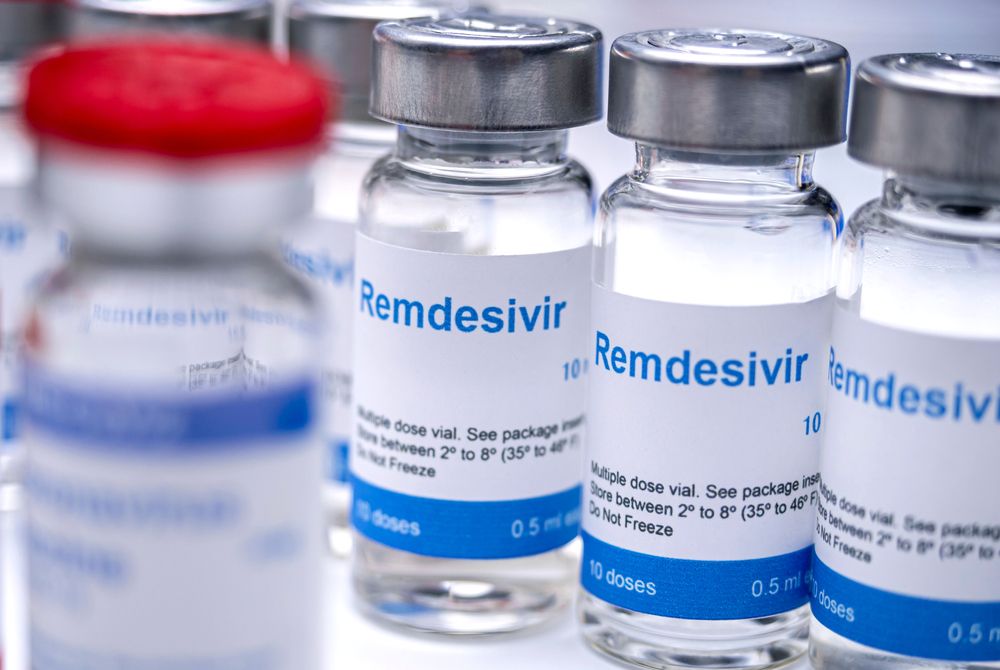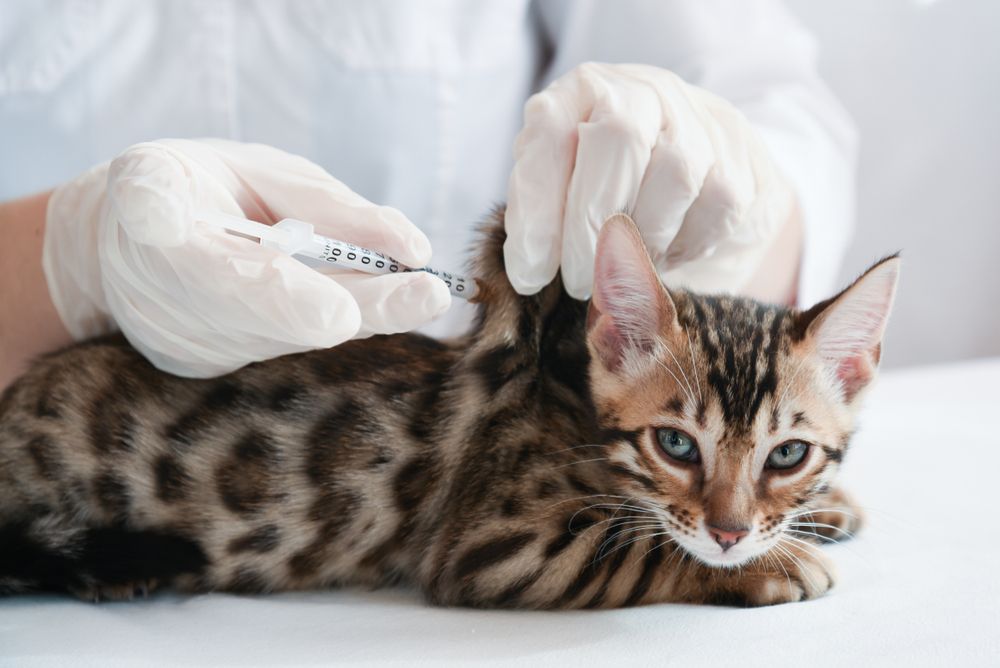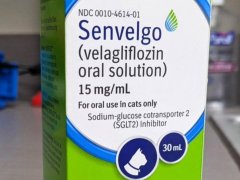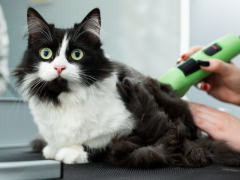
digicomphoto / Shutterstock.com
Remdesivir is an antiviral medication that may be used to treat some cats with feline infectious peritonitis (FIP). In this article you’ll learn more about remdesivir, how it fits with FIP treatment protocols, adverse effects and precautions.
Remdesivir for Cats Overview

About Remdesivir for Cats

A cat with a distended belly like this one has is a common appearance of FIP. Remdesivir may be used to initiate a treatment course for FIP. M. Sam / Shutterstock.com
Remdesivir is an antiviral medication. It may be used short-term as part of treatment protocols for cats with feline infectious peritonitis (FIP).
Remdesivir is the precursor for GS-441524. GS-441524 has become far and away the preferred medication for treating FIP. Remdesivir is a prodrug of GS-441524, meaning that when metabolized after being given, it is rapidly converted into GS-441524 in the body.
Remdesivir is an injectable medication. Its role in treatment of FIP is often only as a way of starting treatment for the first couple of weeks. After an initial treatment period, an oral medication like GS-441524 is then used for continued treatment. Use together has demonstrated a very high treatment survival rate (86%-96%).
Remdesivir can be difficult to obtain, especially in the United States. Use in the UK and Australia may be more common.
Dosing Information for Cats
The following information should not be used to replace a veterinary visit or alter your vet’s prescribing information. You should never use a human medication in your cat that was prescribed for you or a family member without consulting your own vet.
Remdesivir is not an FDA approved medication for use in cats. When used for FIP therapy, it is prescribed in an off-label manner by veterinarians.
When used for FIP treatment, remdesivir is used predominantly as an injectable medication early on. This may be because a cat is very ill from FIP where quick onset of medication is needed, or if orally medicating a cat is difficult.
Exact dosing amounts for remdesivir depends on the form of FIP. Your veterinarian should determine the correct dose for your cat to administer. The FIP Treatment Guide for Veterinary Professionals has the most updated information and treatment protocols based on the latest research and collaboration.
In some cases of relapse during treatment, higher dosages may be used. This has resulted in successful treatment outcomes in most cases of relapse.
How to Administer Remdesivir to Cats

Remdesivir is typically given only as an injection, commonly under the skin, as demonstrated here. Dina da / Shutterstock.com
Remdesivir can be given under the skin as a subcutaneous injection. Or, it may be given intravenously. When given intravenously, it is diluted with sterile 0.9% saline and infused over 10-20 minutes.
Because it is difficult to obtain, Remdesivir is only used when needed. The subcutaneous injections may be given daily at home. But as they are painful and oral medication options are available, this is a less common approach to full treatment.
The intravenous injections should only be given at a veterinary clinic.
The injectable solution has been given orally, though there is limited study data to support its use this way. One 2025 study demonstrated similar treatment success rates (about 86%) with oral remdesivir as seen with oral GS-441524 and molnupiravir.
However, given availability constraints and the wide availability of its metabolite GS-441524 and molnupiravir as oral medications, oral administration of remdesivir is very uncommon.
Remdesivir may be given as an injection daily for a couple of weeks at most, but transition to oral administration of GS-441524 is preferred and the treatment standard for the full 12 week duration of treatment.
Side Effects of Remdesivir for Cats
The most common side effect of remdesivir is pain at the injection site when given subcutaneously under the skin. This occurs in nearly half of cats.
When given under the skin, injection site reactions have also been reported.
In less than 10% of cats, ALT liver elevations have been seen, which has also been documented in humans.
When given intravenously, there is a reported 10% higher chance that existing pleural effusion may worsen or that new pleural effusion may develop. Pleural effusion is the term for fluid around the lungs, and may be found with effusive/wet forms of FIP.
Oral administration of the injectable solution has historically resulted in nausea, drooling, and lethargy in cats. However, a 2025 study involving about 30 cats demonstrated no noticeable side effects.
There is no advantage to giving remdesivir by the oral route compared to its metabolite GS-441524, which is preferred as an oral medication.
Side effect risk of intravenous administration is lessened by diluting the remdesivir in 0.9% saline solution and giving slowly over 10-20 minutes.
Overdose and Emergencies
There is little information about overdoses using remdesivir, given its limited use primarily only in veterinary hospitals.
Any suspected overdose or emergency associated with remdesivir administration should be reported to a veterinary toxicologist at a 24 hour poison consultation center such as one of the following:
- ASPCA Animal Poison Control Center (1-888-426-4435)
- Pet Poison Helpline (1-855-764-7661)
Potential Drug Interactions With Remdesivir
Remdesivir has been used alongside other medications commonly used to treat FIP patients supportively including:
- Glucocorticoid steroids (prednisolone)
- Maropitant (Cerenia)
- Mirtazapine (Mirataz)
- Gabapentin
- Opioid pain medications (like buprenorphine)
Only two drug interactions have been documented:
- Hydroxychloroquine (not used in cats): decreased remdesivir’s antiviral effect in humans
- Itraconazole: synergistic (increased) effect with GS-441524 has been demonstrated.
How to Store Remdesivir
The injectable solution should be refrigerated in a range of 36 degrees F to 46 degrees F (2-8 degrees C). Sealed vials may be stored at room temperature for up to 12 hours.
The lyophilized powder for injection should be stored below 86 degrees F (30 degrees C) and should be used immediately after reconstitution.
Drug Dosing Disclaimer: We are only able to provide doses for medications that are FDA approved for use in cats and only as the label guidelines dictate. For medications that are used off-label we can only provide guidelines and safety information for use. Safe and appropriate dosing for off-label medications can only be determined by a primary care veterinarian.
We encourage you to work with your veterinarian to determine if a particular medication is appropriate for your cat. Changing or adjusting a dose for your cat on your own without consulting with a veterinarian can carry risk. We do not encourage use of medications prescribed for human use in pets without first consulting with a primary care veterinarian.
-
A Budde, J., & A McCluskey, D. (2023). Remdesivir [Professional app]. In Plumb’s Veterinary Drug Handbook (10th ed.). Wiley Blackwell.
-
Taylor, S. S., Coggins, S., Barker, E. N., Gunn-Moore, D., Jeevaratnam, K., Norris, J. M., Hughes, D., Stacey, E., MacFarlane, L., O’Brien, C., Korman, R., McLauchlan, G., Torres, X. S., Taylor, A., Bongers, J., Castro, L. E., Foreman, M., McMurrough, J., Thomas, B., . . . Tasker, S. (2023). Retrospective study and outcome of 307 cats with feline infectious peritonitis treated with legally sourced veterinary compounded preparations of remdesivir and GS-441524 (2020–2022). Journal of Feline Medicine and Surgery, 25(9). https://doi.org/10.1177/1098612x231194460
-
Coggins, S. J., Norris, J. M., Malik, R., Govendir, M., Hall, E. J., Kimble, B., & Thompson, M. F. (2023). Outcomes of treatment of cats with feline infectious peritonitis using parenterally administered remdesivir, with or without transition to orally administered GS‐441524. Journal of Veterinary Internal Medicine, 37(5), 1772–1783. https://doi.org/10.1111/jvim.16803
-
Feline Infectious Peritonitis. (2025, February 19). International Cat Care.
-
FIP Treatment Guide for Veterinary Professionals. (n.d.-b). FIP Vet Guide.
-
Renner, K. A., Cattin, R., Kimble, B., Munday, J., White, A., & Coggins, S. (2025). Efficacy of oral remdesivir in treating feline infectious peritonitis: a prospective observational study of 29 cats. Journal of Feline Medicine and Surgery, 27(5). https://doi.org/10.1177/1098612x251335189







